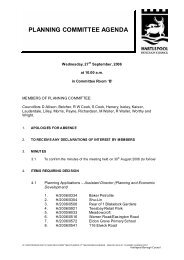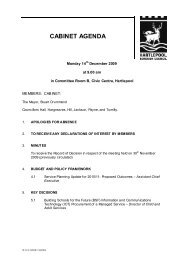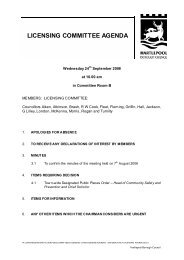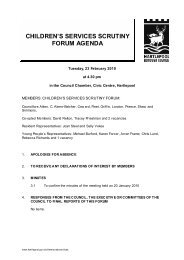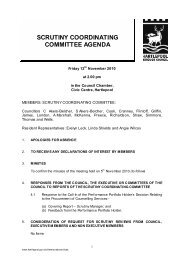Health Scrutiny Joint Committee - Hartlepool Borough Council
Health Scrutiny Joint Committee - Hartlepool Borough Council
Health Scrutiny Joint Committee - Hartlepool Borough Council
Create successful ePaper yourself
Turn your PDF publications into a flip-book with our unique Google optimized e-Paper software.
John’s story<br />
John, 75, has diabetes. He was feeling ill because his diabetes was out of control and he<br />
phoned 999. The ambulance paramedic assessed him at home and then he was brought to<br />
the University Hospital of North Tees. A doctor specialising in diabetes was able to see him<br />
straightaway and he was given the appropriate drugs to stabilise his diabetes. He stayed in<br />
overnight for observation and was allowed home the next day. He saw the diabetes specialist<br />
in outpatients the following week to ensure his diabetes was stable.<br />
Mary’s story<br />
Mary, 70, is taken ill and her son phones 999. The ambulance takes Mary to the University<br />
Hospital of North Tees where she is diagnosed with pneumonia. Mary becomes worse and<br />
she has to be transferred to critical care for intensive medical support. After two days Mary<br />
is improving and she is transferred back to the ward. After three days Mary is allowed to go<br />
home with support from the community team who give her intravenous<br />
(a drip) antibiotics every day for the next 10 days until she has fully recovered.<br />
Sharon’s story<br />
Sharon, 47, from the Fens, <strong>Hartlepool</strong>, noticed her leg was red and sore. She also felt<br />
feverish. She went to her GP who said she needed to be seen by a hospital doctor. Her<br />
husband took her to the ambulatory care unit at the University Hospital of North Tees,<br />
part of the emergency assessment unit. A doctor assessed Sharon’s leg and the soft tissue<br />
infection was diagnosed as cellulitis. She was started off on a drip of antibiotics while in<br />
the ambulatory care unit and after further observations she was allowed home four hours<br />
later. The unit arranged for the rapid response nurses to go to Sharon’s home to give her<br />
intravenous antibiotics each day Three days later she came back to the ambulatory care unit<br />
to see the doctor who was happy with how the soft tissue infection was clearing up. He<br />
recommended intravenous antibiotics until the end of the week and the rapid response team<br />
came to Sharon’s house daily to give the treatment until the infection cleared up. This saved<br />
Sharon and her husband several trips to hospital.<br />
Betty’s story<br />
Betty, 90, from Easington ,was confused and unable to get out of bed and her son called the<br />
GP. The GP thought Betty should be in hospital and asked for her to be admitted in the next<br />
two hours. The ambulance brought Betty to the emergency assessment unit at the University<br />
Hospital of North Tees where she was assessed by doctors. Betty had a urine infection which<br />
was making her confused so doctors started her on antibiotics. Doctors arranged for Betty<br />
to be transferred to the step down ward at the University Hospital of <strong>Hartlepool</strong> in a ward<br />
staffed by highly skilled nurses and therapists. It was becoming clear that Betty was having<br />
difficulty managing in her own home and discussions began so Betty could move to a home<br />
specially set up to meet her needs. Her family were pleased that they could visit her easily in<br />
the two weeks she stayed in hospital.<br />
11<br />
Consultation document 2013



